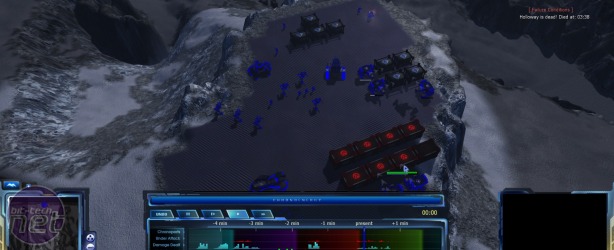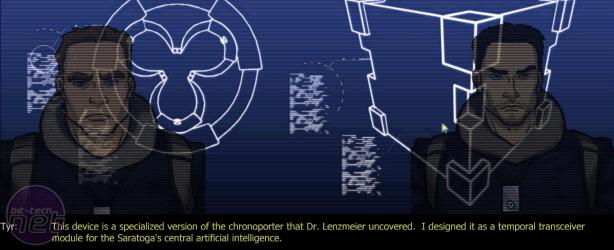
Achron Review
Publisher: Hazardous SoftwarePlatform: PC exclusive
UK Price (as reviewed): £22.99 (inc VAT)
US Price (as reviewed): $29.95 (ex tax)
Maybe we're just keeping with Achron's time travelling concept in our desire to skip straight to the conclusion of this review, but the conclusion doesn't go the way you might imagine. We don't think Achron is a victim of its own genius in attempting to bring time travel to multiplayer strategy gaming, and we don't think that Achron is a magnificent indie title that shows what's really possible with a little innovation and dedication.
Rather, we just don't think it's a very good game.
It's tempting to focus on the time-travel brain-bendiness that's been the defining novelty of the game throughout its long development cycle. This single mechanic, once you get to grips with it, is stunningly inventive and capable of revolutionising the way that you plot your battles. Unfortunately, to spend time discussing the time travel system is to present a misleading impression of Achron as a whole.
The time travel system is ingenious and brilliant, but the rest of the game isn't - in fact, it's the opposite. The plot, for example, is impenetrable, with an incomprehensible and overlong sci-fi focus that sees humans fighting poorly introduced aliens in locales with no frame of reference. The entire tone is terribly characterised, utterly lacking in the nuances that let players so easily grasp the likes of C&C or StarCraft. Instead, the narrative is delivered through painfully dull cutscenes, which see the static cartoon images dribbling technobabble at the rate of melting tar.
Each 'cinematic' is then followed by green-on-black text which, though intended to look futuristic, is more evocative of Geocities. These screens, which are labelled as 'decoded messages' or some-such, offer further expansion to the already-crowded storyline if you can take the time to read them. Personally, we gave up by the time we got around to the second mission.
Focusing on the story and how it's presented might feel like the wrong starting point with a game so clearly ahead of the curve as the time-travel would suggest. When you can't tell if you're closer to Star Trek or Starship Troopers, though, it has to be indicative of a larger problem.
Elsewhere in the gameplay, Achron moves along roughly as you'd expect for a modern real-time strategy game, with only a handful of UI idiosyncrasies and the looming prospect of time travel offering much in the way of spice. Your units are the usual mix of space marines and hover-tanks, with the occasional APC, carrier or gunship thrown in for good measure, and you command these from a top-down perspective.
There's little in the way of deeper features when it comes to combat, though, with Achron lacking the tiered cover-system of Company of Heroes or the multitudinous abilities of StarCraft. Instead, battles are balanced to favour those who have a good sense of timing and a deeper understanding of the tactics that time travel provides - meaning that the complexity is drawn from the overall design itself, rather than the units.
This is good in one sense, as it ties every battle to Achron's central mechanic - we mentioned the time travel, right? - but it would be better if the units themselves were more distinctive. There are three races, each with a different specialty, but it's impossible to shake the feeling that the only feature that's really new is time travel. A lot of the units are indistinguishable, even on a purely visual level.
As it is, despite the tutorial levels making a big show of pointing out how specific units differ, they all feel roughly the same; slow and ugly. Even when you can spot units against dismal, flat levels, it's still tough to identify each unit, as the graphics are so dark and murky. Issuing orders then reveals that nearly all units move with almost audible lethargy too, with only airborne fighters able to cover distance at a barely tolerable pace and without getting stuck navigating corners. A fast-forward function is helpfully provided, but does little more than prompt soldiers from a dreary march to a leisurely stroll.

MSI MPG Velox 100R Chassis Review
October 14 2021 | 15:04











Want to comment? Please log in.